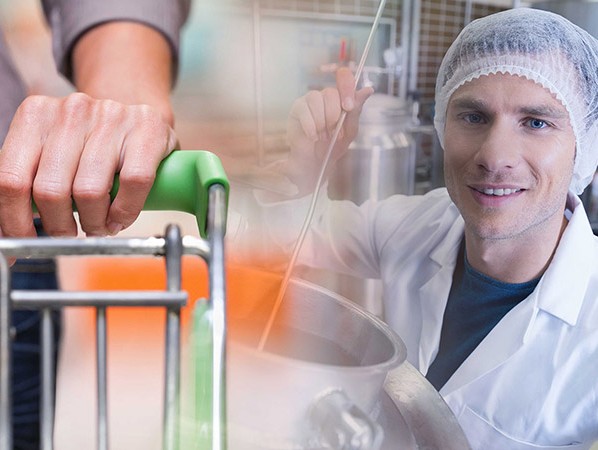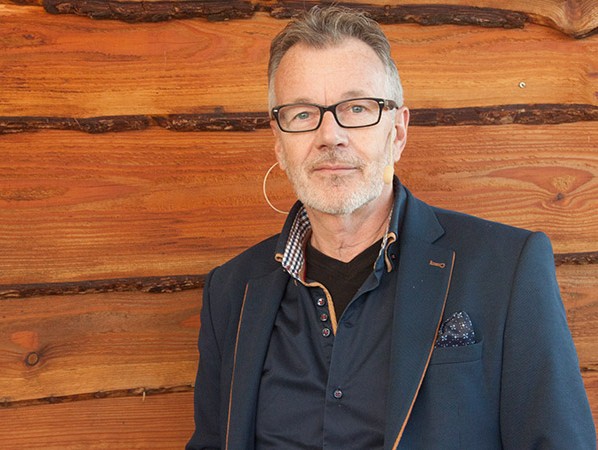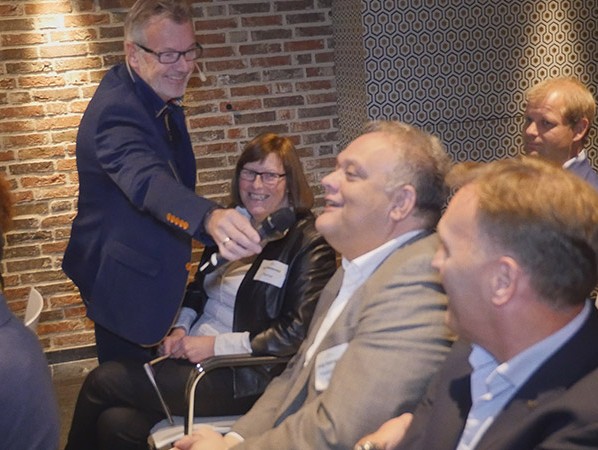
A diverse group of people - growers and retailers, meat, fish, and fruit and vegetable producers - registered for the first knowledge event organised by FoodIndustrie Experts, which has the theme 'Where does the retail sector stand in five years time and how to respond to that?'
They have come to listen to Gerrit Grievink, inspirator for retail organisations, brand manufacturers, and suppliers of fresh products, and to referee and Jumbo entrepreneur Björn Kuipers, who is known for his infectious enthusiasm.
Between the various sessions, there is time to meet each other and share thoughts during a walking dinner. The audience takes their seats, some people sit back to relax. Gerrit Grievink promises that it will be an interactive programme. His motto: "Tell me, and I'll forget what you said Show me, and I will understand”. So, there is absolutely no time to ‘sit back and relax’. Not now, not during the presentation, and certainly not afterwards or tomorrow. Because what he has to say is an extremely urgent message.
Grievink has 120 slides and barely an hour to demonstrate his vision. His story is catapulted into the hall, just as fast as the changes (and what they result in) we see in retail land. "We all keep looking at the US: what does Trump do? But the developments in Asia/China are much more important! Don't forget to focus on the political situation in Germany. And what are the consequences of Brexit for Dutch entrepreneurs?" In short, there is a lot going on. "Even so, we still enjoy our meat, fish, freshly baked bread, and fruit and vegetables. Money will flow", Grievink promises, "... but not automatically your way." Because the manner in which groceries and food reach the consumer is already changing rapidly compared to 10 years ago. Luckily, there is good news as well: "Every threat opens up a new opportunity, as long as you recognise it and can turn it to your advantage," he ensures. "What do we have to do to be relevant tomorrow and the day after?".
Big data, blurring, self-service, automation, algorithms, digital revolution, co-creation, blockchain, sustainability; countless organisations and technological developments turn the chain on its head. "Online shopping is here to stay. And there is a huge amount of money going around in online shopping as well, but who is going to benefit?" He illustrates his point with an example. "This morning, I realised I needed a pointer for my presentation so I drove to Staples. In the store, I looked for the article and then joined the queue at the cashier to pay 40 Euros. If I would have had a bit more time, I could have ordered the same thing online, for 8 Euros. Delivered to my home. More and more consumers are taking this route, and this has a huge impact on the existing shops."
"We are hearing the term 'blockchain' increasingly often. It's a tricky concept behind which is lurking an often unfamiliar world. But wherever we find ourselves in the chain, we will all have to deal with it at some point," the inspirator predicts. "The consumer will expect complete transparency about all costs that are made within the chain, which will lead to 'true pricing'.
Algorithms become smarter: they are systems that will think for us and affect our actions. All in all, it becomes increasingly difficult for entrepreneurs to link an added value to your product/service. How will you get these products visible for the consumer, on the shelf or online, when an algorithm takes the decisions?"

The decrease in the number of shops in cities and neighbourhoods is a hugely underestimated phenomenon, says Grievink. It is closely connected to the influence of private equity firms that buy companies and stipulate control on the company's strategy and financing structure. "They put the profitability under pressure, invest in chain stores, let the company grow, take over other companies and sell off underperforming assets, for example to another private party. We are all familiar with the examples where things went wrong and shops that disappeared from the streets.
Grievink illustrates his statement with the 'Red Queen hypothesis'. "Have you heard of it?", he asks the audience, to which several people shout "Off with his head!". "This hypothesis, coming from the story of Alice in Wonderland, says that species continuously adapt to new circumstances. They are not moving forward, but remain where they are because other species are going through a parallel evolution (for example: the prey is able to move faster; the predator adapts and can do the same). Today's retailers, while trying to respond to all the demands regarding sustainability and e-commerce developments, mainly invest in order to retain what they have."
And while shops are disappearing wherever we look, the delivery market grows. "We see more and more delivery vans driving through our streets: from supermarkets, but mainly from Hello Fresh, Picnic, and Thuisbezorgd.nl. They already determine for you where you buy your products and how much you have to pay for them. These changes within the chain lead to new earnings models and the traditional models find themselves under pressure. Which products and services will you offer to create value as well as to make a profit? What will be your 'licence to deliver'? You simply have to collaborate. But with whom? And how?
"The new generation earns its money via Facebook and Instagram. And what is the reaction of the 'establishment'? They shout that it's not fair. In the meantime, they try to keep up with each other following the same path without having a clear vision of where they are going. When you keep doing that, you will become like lemmings and neatly follow the one running in front of you, straight into the abyss. Over the past few years, this is how many supermarket formulas have gone down. New players such as Amazon, AliBaba, and Ali Express already grabbed their chances and are turning the world on its head. Corporations and companies like Unilever, Bakefive, and Friesland already deliver their products directly to the consumer without involving the retail sector.

"The death warrant for brands has a name", warns Grievink. "Amazon, now also operational in the Netherlands, has developed one of the more sophisticated automatic speech recognition systems called 'Alexa'." A speech recognition system, similar to Siri, communicates with products and services in the own home via an app. It can operate your lighting, wake you up in the morning, search for songs on Spotify, regulate the temperature, or activate your robotic vacuum cleaner. But it also answers the question of how to make a cheesecake, or which supermarket has Coca Cola at a discount. Comparison sites already determine where and how we buy, book our holidays, and which restaurants we visit. In just a few years, speech recognition systems like Alexa will decide what we eat, where we buy it, and who is going to deliver it."
The presentation given by Björn Kuipers - Jumbo entrepreneur and FIFA referee - was perfectly in line with Grievink's story. He showed countless fragments of games and decision moments, and his enthusiastic presentation made the participants think about internal communication and team responsibility; about leadership. The common denominator: "You never win on your own. Together, each achieves more." The current developments also affect his own Jumbo supermarket. That is why Kuipers and his Jumbo team are rapidly shifting gears to stay ahead of the game.
A lot is going to change, companies are looking for more options to remove links from the chain. This also puts pressure on supermarkets. After the event, many participants indicated that they are not simply shocked by the changes that are going on in the market, but especially by how far this transition has already come about. A reaction from the audience: "My challenge, right now, is: how do I get my products in the Hello Fresh box? One week, I deliver nothing, and then the next week they add my product and I can barely keep up. This will be my new reality for the coming years. What I did notice is that we will need each other more and more, as entrepreneurs. If you want to survive, you just have to collaborate".
FOODINDUSTRIE EXPERTS
Foodindustrie Experts is an initiative launched by five keen and committed players within the food sector: Espera, Evo-it, Multivac, RBK, and the trade magazine Voedingsindustrie.
The partners each offer their own specialist knowledge in the areas of routes, company networks, packaging, transport (planning), software, automation, and communication. The joint focus is the optimisation of operational processes within the (fresh) food sector, with the aim to offer the customer or client a comprehensive solution.
Once a year, they organise a knowledge event where DGAs/decision makers from food producing companies can meet. Would you like to join us next time? Register now so we can send you a reminder and keep you up to date!
Source: © Vakblad Voedingsindustrie 2019